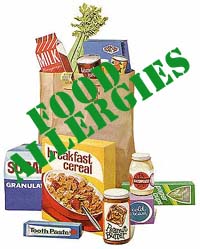Elimination Diets
 Elimination or allergy diets are used to isolate food allergies or food sensitivity. A food allergy describes an immune system response, whilst a food intolerance is an adverse reaction to food (unrelated to the immune system).
Elimination or allergy diets are used to isolate food allergies or food sensitivity. A food allergy describes an immune system response, whilst a food intolerance is an adverse reaction to food (unrelated to the immune system).
There are a number of medical symptoms that may be related to food; candida, irritable bowel syndrome, diverticulitis, asthma, eczema, migraines, unexplained rashes, and lactose intolerance.
Using Elimination Diets
The basic elimination diet first removes all potential food allergens from the diet, and then re-introduces these foods one at a time. These process should always be undertaken in consultation with your physician.
When undertaken an elimination diet, it is advisable to keep a food journal, and log all food items and amounts as accurately as possible – along with any symptoms experienced. This can help to isolate food allergies or intolerances.
Basic Elimination Plan
Eliminate the following foods from the diet for a period of 7 days to a month:
- Dairy products, including cheese. [Instead, use soy milk and soy cheese; rice milk, rice-based ice cream.]
- Egg and egg-containing products.
- Food products containing gluten, such as wheat and wheat-based products (including pasta), and barley, oat or rye grains. (Alternative grains could be brown rice, buckwheat, spelt, millet, potatoes or sweet potatoes).
- Citrus fruits.
- Corn and corn-containing products.
- All processed foods, including caffeine.
- Sulfite containing foods– found in dried fruit and wine’s
Note that suddenly stopping some foods (such as caffeine) can result in withdrawal symptoms (typically headaches) – however this should only last a few days to a week.
Next, reintroduce one food group to your diet roughly every 5 days
The reintroduction period allows sufficient time to determine any intolerances.
Other Elimination Diets
Fasting
This drastic elimination diet involves fasting for the first 5 days, taking nothing but bottled spring water. This kind of elimination diet should be reserved for only the most difficult cases.
Do not try this fasting approach without first consulting your doctor.
Lamb-and-Pears Elimination Diet
As the name suggests, this diet involves only eating lamb and pears. The diet is sometimes modified to a turkey and pears, or turkey, rice and pears). This diet is also for only the more severe cases.
Few-Foods Elimination Diet
The next step up, is the few-foods or rare-foods elimination diet plan. This involves eating a dozen or so foods that the patient eats only rarely.
The Rare-Food Elimination Diet
This is an extension of the few-foods idea, except that instead of eating uncommonly- eaten foods the patient is asked to eat exotic items (e.g. yams, buckwheat).
The Regular Elimination Diet
This is the typical form of elimination diet where most fruits, vegetables, fish and meats are allowed, but wheat and other cereals, milk, eggs, and other common offending foods are eliminated. This type of elimination diet is often the most helpful.
See Also
-
Citations:
- Gonsalves, N., Yang, G. Y., Doerfler, B., Ritz, S., Ditto, A. M., & Hirano, I. (2012). Elimination diet effectively treats eosinophilic esophagitis in adults; food reintroduction identifies causative factors. Gastroenterology, 142(7), 1451-1459. link
- Kagalwalla, A. F., Sentongo, T. A., Ritz, S., Hess, T., Nelson, S. P., Emerick, K. M., … & Li, B. U. K. (2006). Effect of six-food elimination diet on clinical and histologic outcomes in eosinophilic esophagitis. Clinical Gastroenterology and Hepatology, 4(9), 1097-1102. link
- Stefanini, G. F., Saggioro, A., Alvisi, V., Angelini, G., Capurso, L., Lorenzo, G. D., … & Melzi, G. (1995). Oral cromolyn sodium in comparison with elimination diet in the irritable bowel syndrome, diarrheic type multicenter study of 428 patients. Scandinavian journal of gastroenterology, 30(6), 535-541. link
I have excess saliva (foaming type) every day. I use alot of aspertane in tea. Every time I drink tea, I seem to just get too much saliva and have to spit in kleenex.
what is your thought on this.?
Hey Susan,
Sounds like a reaction to me, why not try a different sweetener or better yet learn to drink tea without any. 🙂
Need to get the sulfite elimination diet
Spelt is considered wheat, it contains gluten. It is NOT an alternative to wheat.
Although this article is very helpful there is one error. You are not supposed to have any soy products during an elimination diet. Why? Because many people are allergic to soy. Also you are not supposed to eat white potatoes, but you can have sweet potatoes.